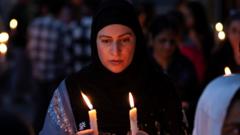The assault on Dar occurred in Mussoorie, where the traditional shawls he sells are regarded as luxury items, representing his cultural heritage. However, after enduring violent harassment linked to the recent Kashmir attack, Dar stated, “We are too scared to go back.” Despite police involvement and arrests of the attackers, the swift release of these individuals raised concerns about the efficacy of law enforcement in protecting Kashmiri communities.
Following the attack, security forces increased their presence in the region, implementing extensive crackdowns that many locals perceive as collective punishment. Former officials have criticized these tactics, highlighting the plight of innocent civilians unfairly caught in the crossfire of political strife.
Kashmiri students and vendors have voiced a stark shift in public sentiment, where fear and suspicion now overshadow the bonds they once shared with non-Kashmiri individuals. While many in the region have called for peace, rampant harassment has triggered a mass exodus back to Kashmir for safety. The ongoing unrest within the broader geopolitical context continues to strain relations between communities and exacerbates the traumatic cycle of violence gripping Kashmir.
As Kashmiris strive for a sense of normalcy in their lives, the impact of repressive measures and targeted violence against them unfolds, leaving them to navigate the tenuous balance between identity, safety, and belonging.
Following the attack, security forces increased their presence in the region, implementing extensive crackdowns that many locals perceive as collective punishment. Former officials have criticized these tactics, highlighting the plight of innocent civilians unfairly caught in the crossfire of political strife.
Kashmiri students and vendors have voiced a stark shift in public sentiment, where fear and suspicion now overshadow the bonds they once shared with non-Kashmiri individuals. While many in the region have called for peace, rampant harassment has triggered a mass exodus back to Kashmir for safety. The ongoing unrest within the broader geopolitical context continues to strain relations between communities and exacerbates the traumatic cycle of violence gripping Kashmir.
As Kashmiris strive for a sense of normalcy in their lives, the impact of repressive measures and targeted violence against them unfolds, leaving them to navigate the tenuous balance between identity, safety, and belonging.




















